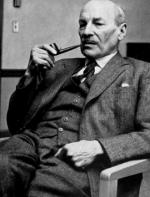Disable ads!
Clement Attlee
Clement Richard Attlee, 1st Earl Attlee, KG OM CH PC FRS (3 January 1883 – 8 October 1967) was a British Labour Party politician who served as the Prime Minister of the United Kingdom from 1945 to 1951, and as the Leader of the Labour Party from 1935 to 1955. Attlee was the first person to hold the office of Deputy Prime Minister of the United Kingdom, serving under Winston Churchill in the wartime coalition government, before going on to lead the Labour Party to a landslide election victory in 1945 and a narrow victory in 1950. He became the first Labour Prime Minister ever to serve a full five-year term, as well as the first to command a Labour majority in Parliament, and remains to date the longest-ever serving Leader of the Labour Party. First elected to Parliament in 1922 as the MP for Limehouse, he rose quickly to become a minister in the minority government led by Ramsay MacDonald in 1924. In 1931, after the Labour Party had suffered a disastrous election defeat, he was elected Deputy Leader of the Labour Party. Four years later, he became the Leader of the Labour Party after the resignation of George Lansbury. At first advocating pacificism and appeasement, he later reversed this policy and by 1938 became a strong critic of Neville Chamberlain's attempts to appease Adolf Hitler. He subsequently took Labour into the wartime coalition government formed by Winston Churchill in 1940. Initially serving as Lord Privy Seal, he was appointed Deputy Prime Minister two years later. With the end of the Second World War in Europe in May 1945, the coalition government was dissolved and Attlee led Labour to win a huge majority in the ensuing general election two months later. The government he led built the post-war consensus, based upon the assumption that full employment would be maintained by Keynesian policies and that a greatly enlarged system of social services would be created – aspirations that had been outlined in the wartime Beveridge Report. Within this context, his government undertook the nationalisation of public utilities and major industries, as well as the creation of the National Health Service. After initial Conservative opposition to Keynesian fiscal policy, this settlement was broadly accepted by all parties for over three decades until Margaret Thatcher became Prime Minister in 1979. His government also presided over the decolonisation of a large part of the British Empire, granting British India, Burma, and Ceylon independence, as well as ending the British Mandate of Palestine and the British Mandate of Jordan. He strongly supported the Cold War against Soviet Communism. When the budgetary crisis forced Britain out of Greece in 1947 he called on Washington to counter the Soviet Union with the Truman Doctrine. He avidly supported the Marshall Plan to rebuild Western Europe with American money, and the NATO military alliance against the Soviet bloc. After leading Labour to a narrow victory in 1950, he sent British troops to fight in the Korean War. Attlee was narrowly defeated by Churchill in 1951; he retired as Labour leader after losing the 1955 General Election and was elevated to the House of Lords. In public, Attlee appeared modest and unassuming; he was ineffective at public relations and lacked charisma. His strengths emerged behind the scenes, especially in committees where his depth of knowledge, quiet demeanour, objectivity and pragmatism proved decisive. He saw himself as spokesman on behalf of his entire party, and successfully kept its multiple factions in harness. His reputation among scholars in recent decades has been much higher than during his years as Prime Minister, thanks to his role in forging the welfare state and opposing Stalin in the Cold War. In 2004 he was voted the greatest British Prime Minister of the 20th Century by a poll of 139 academics organised by Ipsos MORI.
 Read more on wikipedia.org Read more on wikipedia.org
 All quotes by Clement Attlee All quotes by Clement Attlee
 Edit Edit
|

|
|
|
|
|
Background photo by Giuliana
|